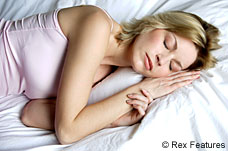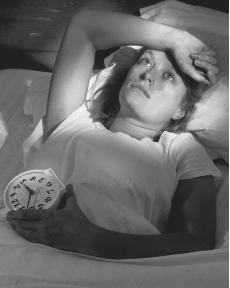Are you getting enough sleep?
 Sleep can be defined as a state of consciousness that differs from alert wakefulness by a loss of critical reactivity to events in the environment with a profound alteration in the function of the brain. Sleep is not a uniform phenomenon and it varies greatly in nature and depth from time to time in the same person and between individuals as well. During sleep, organs like kidney, heart, lung, gastrointestinal tract, etc remains active. Similarly brain also remains active during sleep and it undergoes an active reorganization.
Sleep can be defined as a state of consciousness that differs from alert wakefulness by a loss of critical reactivity to events in the environment with a profound alteration in the function of the brain. Sleep is not a uniform phenomenon and it varies greatly in nature and depth from time to time in the same person and between individuals as well. During sleep, organs like kidney, heart, lung, gastrointestinal tract, etc remains active. Similarly brain also remains active during sleep and it undergoes an active reorganization.Sleep requirement-
Varies inversely with age.
For:
New born baby- 16-18 hours;
Children- 10-12 hours;
Adults- 6-8 hours;
Old age- 5 hours.
Why do we need to sleep?
There are many theories about this, but two prevail. One is that we use sleep for conservation of energy. When we sleep, everything is switched down, and this allows us to balance the day’s expenditure of energy. The second theory is one of restoration: repair and synthesis of body structures and particularly the brain.
Physiological changes during sleep:
During sleep somatic activity is greatly decreased. Threshold of many reflexes is elevated and responsiveness is also lessened. Man cannot remember the events occurring during sleep. Basal metabolic rate being least, all tissues and organs perform the least work. Changes are given below:
1. Circulatory system. Pulse rate, cardiac output, vasomotor tone, and blood pressure reduced.
2. Respiratory system. Tidal volume, rate of respiration and pulmonary ventilation lowered.
3. Basal metabolic rate. Reduced by 10-15 %.
4. Urine. Volume less, reaction variable, specific gravity and phosphates are raised.
5. Secretions. Salivary and lachrymal secretion reduced; Gastric secretion unaltered or rose; Sweat- raised.
6. Muscles. Relaxed.
7. Eyes. Eyeballs rolls up and out due to flaccid external ocular muscles; eyelids come closer, due to dropping of upper eyelids; pupils- contracted.
8. Blood. Volume increased (plasma diluted).
9. Nervous system. Deep reflexes reduced; vasomotor reflexes more brisk.
10. Electroencephalographic changes during sleep. The EEG pattern changes at different stages from normal waking state to sleep depending upon the degree of sleep. According to the EEG pattern the sleep is divided into: Light sleep, which is often associated with rapid wandering eye movement (paradoxical sleep), and is called rapid eye movement sleep (REM sleep or rhombencephalic sleep) and the other, is deep sleep. During REM sleep, high incidence of penile erection and grinding of teeth (bruxism) occur in the subjects. On the other hand, non rapid eye movement (NREM sleep or slow wave sleep) is generally associated with spindle or synchronized slow wave.
Effect of prolonged sleeplessness in man:
Observed on subjects kept awake for 60-114 hours. Objective changes are few, viz. Babinski- extensor. Equilibrium disturbed Neuromuscular- fatigue etc.Subjective symptoms are chief, viz. (a). Mental concentration difficult and inaccurate. (b). Threshold for pain lowered. If very much prolonged may cause collapse and death. Cortical nerve cells undergo shrinkage and chromatolysis. The lethal period of sleeplessness in man is not known. In dogs it is about 14 days.
 Insomnia:
Insomnia: Abnormal wakefulness or inability to sleep is called insomnia. Insomnia is a condition wherein people have difficulty in sleeping, leading to fatigue, loss of concentration and restlessness. Lack of sleep causes an inability to complete daily tasks and solve problems, as well as diminished mood and general well-being. There can be serious consequences to your health. A study over 10 years involving more than 71,000 middle aged women showed that those who slept for less than seven hours a night had a marked increase in risk of a heart attack. The same applies to men. A similar , although much smaller study showed that men who slept five hours or less each working day had twice the heart attack risk of men who were sleeping more.
Your looks will also suffer from a series of late nights: Dark circles appear under the eyes, the skin becomes pasty and the eyes become bleary and bloodshot. In short, without the requisite number of hours of shut eyes, you will be ugly, grumpy and unpleasant to be around.
Types:
It can be classified into 3 types:
1. Transient (short term-single night to few nights).
2. Intermittent (on and off).
3. Chronic (constant, long standing).
What’s interrupting your sleep?
True insomnia usually includes time spend tossing and turning even when you’re really trying to get enough rest. Around one third of us will be affected by this at some point. Some things that might disrupt your nights include caffeine, alcohol (it may make you doze for a while, but it can interfere with your nights rest), smoking, heavy meals close to bedtime, stress, depression, anxiety, age or even heartburn (more prominent in pregnant women). Chronic disorders like diabetes, kidney disease and arthritis, and use of strong medication are other factors.


Homeopathic Treatment:
Homeopathic medicines works wonderfully for insomnia without any risk of addiction and without causing any side effects.
1. Aconite. Sleeplessness associated with restlessness, anxiety and fear.
2. Arsenic alb. This works well on persons who are anxious and mentally restless. Can’t remain in one position, changes position frequently in bed to get asleep, but fails.
3. Arnica. Insomnia due to exhaustion; everything on which person lies seems too hard.
4. Belladonna. Sleepy but cannot sleep due to restlessness and horrible dreams. Fear of imaginary things like ghosts, wild animals, etc.
5. Coffea cruda. Sleeplessness due to mental excitement and nervous stimulation. Insomnia due to grief, bad news or from overexcitement.
6. Ignatia. Transient insomnia caused by an emotional upset (grief or loss, a disappointment in love, anger, fright, worry, coffee, tobacco, a shock, or even an argument).
7. Nat mur. Sleepy in the forenoon. Sleeplessness due to grief. Dreams of robbers and feels so terrified about it that they do not feel satisfied till a through search is made. Chronic insomnia, with persistent thought, dwells upon past unpleasant events and always wants to be alone.
8. Kali phos. Insomnia from nervous exhaustion caused by overwork or mental strain, or following an exhausting illness.
9. Nux vom. Insomnia which is caused due to over indulgence of stimulants, food and drinks. It is also useful in ailments caused due to loss of sleep.
10. Uranium nit. Insomnia in diabetics.
11. Mag mur. Sleeplessness during menses.
12. Other medicines are Lachesis, Arg Nit, Chamomilla, Gelsemium, Hyosyamus, Opium, Passiflora, Pulsatilla, Rauwolfia, Staphysagria, sulphur, Rhus Tox, etc.


0 Comments:
Post a Comment
<< Home